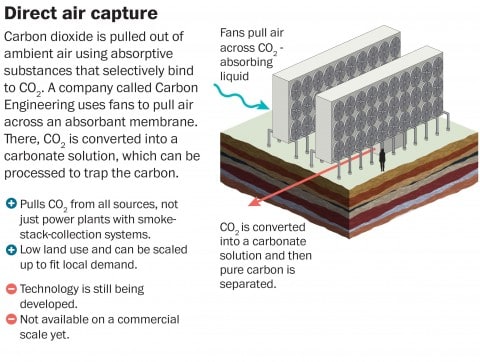Source: powermag.com
Published: October 22, 2015

By Aaron Larson
The ETH spin-off company Climeworks AG has announced plans to construct and operate an industrial scale CO2 capture plant to be operational by mid-2016.
The Oct. 21 announcement said the plant in Hinwil (Canton of Zurich, Switzerland) “has the capacity to capture 900 tons of CO2 from the atmosphere per year.” For comparison, The Carbon Engineering direct air carbon capture pilot project, launched earlier this month along the coast of British Columbia, is designed to capture up to 1 million mt of CO2 per day, while the post-combustion carbon capture process at SaskPower’s Boundary Dam 3 project captures 3,240 metric tons of CO2 each day.
Rather than using the captured greenhouse gas for injection in enhanced oil recovery operations or geologic sequestration, as is the case with the two Canadian projects mentioned, the Climeworks project plans to sell the captured CO2 to a greenhouse to enhance the growth of vegetables and lettuce by up to 20%.
The project is part of a three-year pilot and demonstration project with Gebrüder Meier and Zweckverband Kehrichtverwertung Zürcher Oberland KEZO (a municipal waste disposal company) as project partners. The project is supported by the Swiss Federal Office of Energy (SFOE).
The main goal of the project, developers say, is to industrialize Climeworks’ “Direct Air Capture (DAC) technology and continuously operate an industrial scale plant that captures CO2 from ambient air.” Development and building costs are estimated at 3 to 4 million euros.
Another goal is to determine the plants’ operational costs, “in order to define business models for implementing the technology internationally.”
The plant will be installed at the waste recycling facility of KEZO, in Hinwil, which is powering the DAC plant with heat and electricity.
Depending on the results of the pilot, Climeworks, like its North American competitor Carbon Engineering, hopes to take the technology another step, “to eventually supply air captured CO2 to Power-to-Gas / Power-to-Liquids technologies to efficiently store renewable electricity by producing synthetic fuels” that would not compete with food production for agricultural land and water use.
—Gail Reitenbach, PhD, editor (@GailReit, @POWERmagazine)
